自学考试英语考前重点复习(unit24)
- 格式:doc
- 大小:45.00 KB
- 文档页数:22
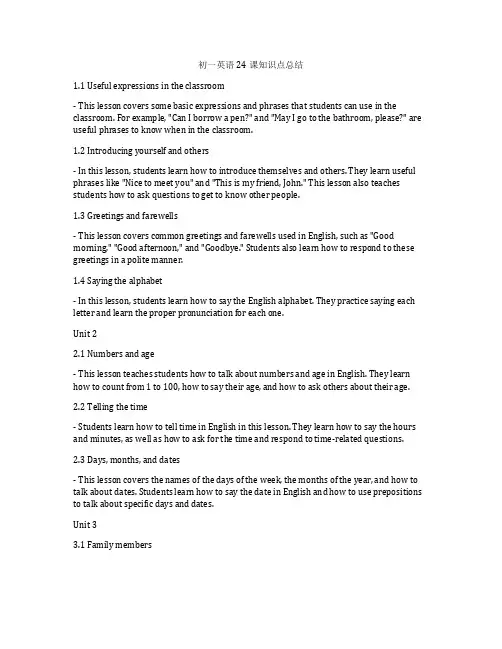
初一英语24课知识点总结1.1 Useful expressions in the classroom- This lesson covers some basic expressions and phrases that students can use in the classroom. For example, "Can I borrow a pen?" and "May I go to the bathroom, please?" are useful phrases to know when in the classroom.1.2 Introducing yourself and others- In this lesson, students learn how to introduce themselves and others. They learn useful phrases like "Nice to meet you" and "This is my friend, John." This lesson also teaches students how to ask questions to get to know other people.1.3 Greetings and farewells- This lesson covers common greetings and farewells used in English, such as "Good morning," "Good afternoon," and "Goodbye." Students also learn how to respond to these greetings in a polite manner.1.4 Saying the alphabet- In this lesson, students learn how to say the English alphabet. They practice saying each letter and learn the proper pronunciation for each one.Unit 22.1 Numbers and age- This lesson teaches students how to talk about numbers and age in English. They learn how to count from 1 to 100, how to say their age, and how to ask others about their age. 2.2 Telling the time- Students learn how to tell time in English in this lesson. They learn how to say the hours and minutes, as well as how to ask for the time and respond to time-related questions.2.3 Days, months, and dates- This lesson covers the names of the days of the week, the months of the year, and how to talk about dates. Students learn how to say the date in English and how to use prepositions to talk about specific days and dates.Unit 33.1 Family members- In this lesson, students learn how to talk about their family members in English. They learn the words for different family relationships, such as "mother," "father," "sister," and "brother."3.2 Describing people- Students learn how to describe people's physical appearance and personality traits in this lesson. They learn adjectives to describe height, weight, hair color, and other physical characteristics, as well as adjectives to describe personality traits, such as "friendly," "shy," and "outgoing."3.3 Possessive adjectives- This lesson covers possessive adjectives in English, such as "my," "your," "his," "her," "our," and "their." Students learn how to use these adjectives to show ownership or possession. Unit 44.1 School subjects and activities- Students learn how to talk about their school subjects and activities in this lesson. They learn the names of different subjects, such as "math," "science," and "history," as well as how to talk about what they do in each class.4.2 Asking and giving directions- This lesson covers how to ask for and give directions in English. Students learn useful phrases for asking and giving directions, as well as important vocabulary related to giving and receiving directions.4.3 Prepositions of place- Students learn about prepositions of place in this lesson, such as "in," "on," "under," "behind," and "between." They learn how to use these prepositions to talk about the location of objects and people in different places.Unit 55.1 Daily routines- This lesson covers how to talk about daily routines and activities in English. Students learn how to use time expressions to talk about what they do every day, such as "in the morning," "in the afternoon," and "at night."5.2 Using the present simple tense- Students learn how to use the present simple tense to talk about habitual actions and routines in this lesson. They learn how to form affirmative and negative sentences, as well as questions, using the present simple tense.5.3 Adverbs of frequency- This lesson covers adverbs of frequency, such as "always," "often," "sometimes," "rarely," and "never." Students learn how to use these adverbs to talk about how often they do different activities.Unit 66.1 Talking about likes and dislikes- In this lesson, students learn how to talk about their likes and dislikes in English. They learn different expressions, phrases, and vocabulary to express what they enjoy and what they don't enjoy.6.2 Using the verb "to like"- Students learn how to use the verb "to like" to talk about their preferences in this lesson. They learn how to make affirmative and negative sentences, as well as questions, using the verb "to like" and different activities.6.3 Making plans- This lesson covers how to talk about making plans and arrangements in English. Students learn useful phrases and vocabulary to talk about what they plan to do in the future, as well as how to make suggestions and invitations to others.Unit 77.1 Talking about colors- Students learn the names of different colors in English in this lesson. They also learn how to use adjectives to describe the colors of different objects and things.7.2 Using there is/there are- This lesson covers how to use "there is" and "there are" to talk about the presence of objects and things in different places. Students learn how to use these expressions to make affirmative and negative sentences, as well as questions.7.3 Describing places- Students learn how to describe different places, such as their school, their hometown, or a specific location, in this lesson. They learn how to use adjectives and prepositions to talk about the characteristics and location of different places.Unit 88.1 Talking about the weather- In this lesson, students learn how to talk about the weather in English. They learn different weather vocabulary and expressions, as well as how to make small talk about the weather with others.8.2 Using the present continuous tense- Students learn how to use the present continuous tense to talk about actions happening at the moment of speaking in this lesson. They learn how to form affirmative and negative sentences, as well as questions, using the present continuous tense.8.3 Talking about future plans- This lesson covers how to talk about future plans and arrangements in English. Students learn how to use time expressions to talk about what they are going to do in the future, as well as how to make offers and promises to others.Overall, these knowledge points provide students with a solid foundation in the English language, covering essential topics such as greetings, numbers, family, daily routines, likes and dislikes, and more. By mastering these knowledge points, students can build a strong grasp of the English language and communicate effectively in various everyday situations.。
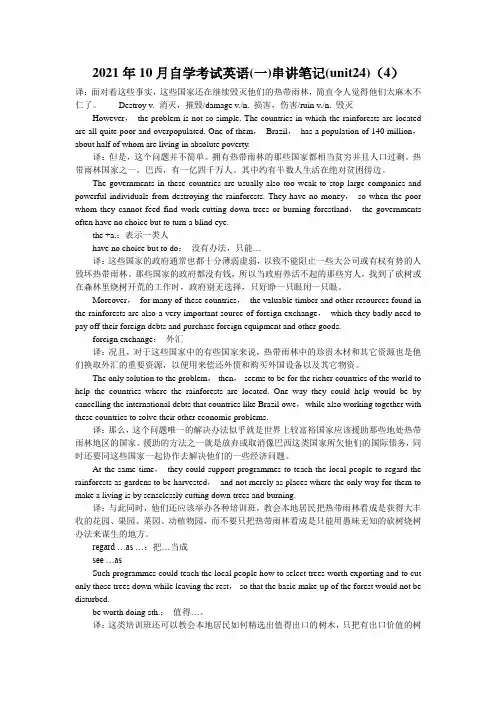
2021年10月自学考试英语(一)串讲笔记(unit24)(4)译:面对着这些事实,这些国家还在继续毁灭他们的热带雨林,简直令人觉得他们太麻木不仁了。
Destroy v. 消灭,摧毁/damage v./n. 损害,伤害/ruin v./n. 毁灭However,the problem is not so simple. The countries in which the rainforests are located are all quite poor and overpopulated. One of them,Brazil,has a population of 140 million,about half of whom are living in absolute poverty.译:但是,这个问题并不简单。
拥有热带雨林的那些国家都相当贫穷并且人口过剩。
热带雨林国家之一,巴西,有一亿四千万人。
其中约有半数人生活在绝对贫困傍边。
The governments in these countries are usually also too weak to stop large companies and powerful individuals from destroying the rainforests. They have no money,so when the poor whom they cannot feed find work cutting down trees or burning forestland,the governments often have no choice but to turn a blind eye.the +a.:表示一类人have no choice but to do:没有办法,只能…译:这些国家的政府通常也都十分薄弱虚弱,以致不能阻止一些大公司或有权有势的人毁坏热带雨林。
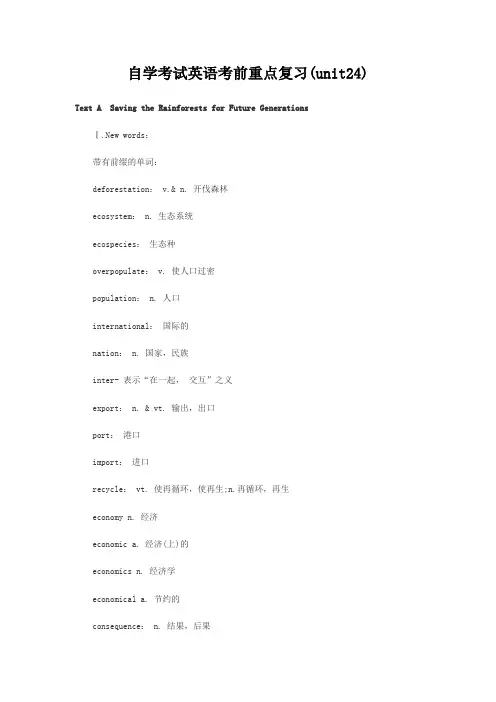
自学考试英语考前重点复习(unit24) Text A Saving the Rainforests for Future GenerationsⅠ.New words:带有前缀的单词:deforestation: v.& n. 开伐森林ecosystem: n. 生态系统ecospecies:生态种overpopulate: v. 使人口过密population: n. 人口international:国际的nation: n. 国家,民族inter- 表示“在一起,交互”之义export: n. & vt. 输出,出口port:港口import:进口recycle: vt. 使再循环,使再生;n.再循环,再生economy n. 经济economic a. 经济(上)的economics n. 经济学economical a. 节约的consequence: n. 结果,后果consequent: a. 作为结果的massive: a. 大量的;大而重的,魁伟的mass: n. 群众,大量regional: a. 地区的region: n. 地区globe: n. 地球global: a. 全球的contribute: v. 贡献,捐献contribution: n. 贡献,捐献,投稿contributor: n. 捐助者,贡献者senseless: a. 无知觉的;无意义的,愚蠢的living: n. 生活,生计make one's living 谋生newly: ad. 新近,最近;重新,以新的方法合成词:rainforest: n. 热带雨林rainfall: n. (降)雨量;一场雨greenhouse: n. 温室forestland: n. 林地make-up: n. 组成,化妆课文中出现的重点单词:1.upset v. 弄翻,打翻;使苦恼过去式、过去分词:(upset-upset-upset )a. 不安的;不适的;不舒服的E.g.: The large wave upset the boat.He is upset because of the generation gap.2.contribute (vi./vt)E.g.: The Nobel Prize winner contributed much to the research in this fiel d.contribute to:有助于;捐献;起作用His carelessness contributed to the accident.3.derive v. 由…。
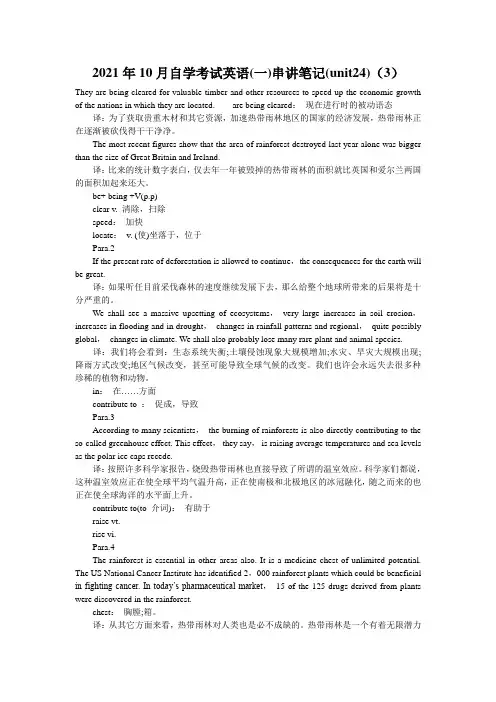
2021年10月自学考试英语(一)串讲笔记(unit24)(3)They are being cleared for valuable timber and other resources to speed up the economic growth of the nations in which they are located.are being cleared:现在进行时的被动语态译:为了获取贵重木材和其它资源,加速热带雨林地区的国家的经济发展,热带雨林正在逐渐被砍伐得干干净净。
The most recent figures show that the area of rainforest destroyed last year alone was bigger than the size of Great Britain and Ireland.译:比来的统计数字表白,仅去年一年被毁掉的热带雨林的面积就比英国和爱尔兰两国的面积加起来还大。
be+ being +V(p.p)clear v. 清除,扫除speed:加快locate:v. (使)坐落于,位于Para.2If the present rate of deforestation is allowed to continue,the consequences for the earth will be great.译:如果听任目前采伐森林的速度继续发展下去,那么给整个地球所带来的后果将是十分严重的。
We shall see a massive upsetting of ecosystems,very large increases in soil erosion,increases in flooding and in drought,changes in rainfall patterns and regional,quite possibly global,changes in climate. We shall also probably lose many rare plant and animal species.译:我们将会看到:生态系统失衡;土壤侵蚀现象大规模增加;水灾、旱灾大规模出现;降雨方式改变;地区气候改变,甚至可能导致全球气候的改变。
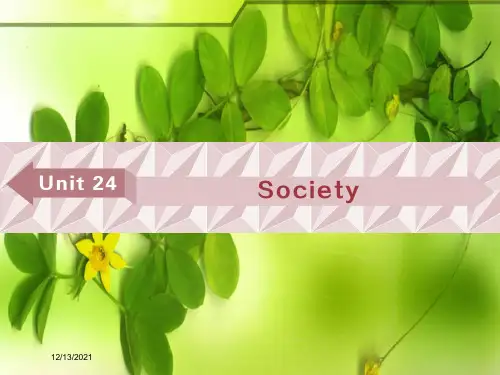
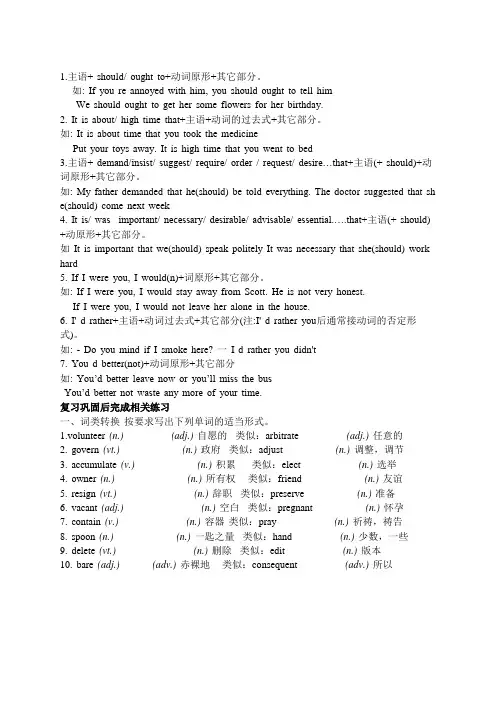
1.主语+ should/ ought to+动词原形+其它部分。
如: If you re annoyed with him, you should ought to tell himWe should ought to get her some flowers for her birthday.2. It is about/ high time that+主语+动词的过去式+其它部分。
如: It is about time that you took the medicinePut your toys away. It is high time that you went to bed3.主语+ demand/insist/ suggest/ require/ order / request/ desire…that+主语(+ should)+动词原形+其它部分。
如: My father demanded that he(should) be told everything. The doctor suggested that she(should) come next week4. It is/ was important/ necessary/ desirable/ advisable/ essential.….that+主语(+ should)+动原形+其它部分。
如It is important that we(should) speak politely It was necessary that she(should) work hard5. If I were you, I would(n)+词原形+其它部分。
如: If I were you, I would stay away from Scott. He is not very honest.If I were you, I would not leave her alone in the house.6. I' d rather+主语+动词过去式+其它部分(注:I' d rather you后通常接动词的否定形式)。
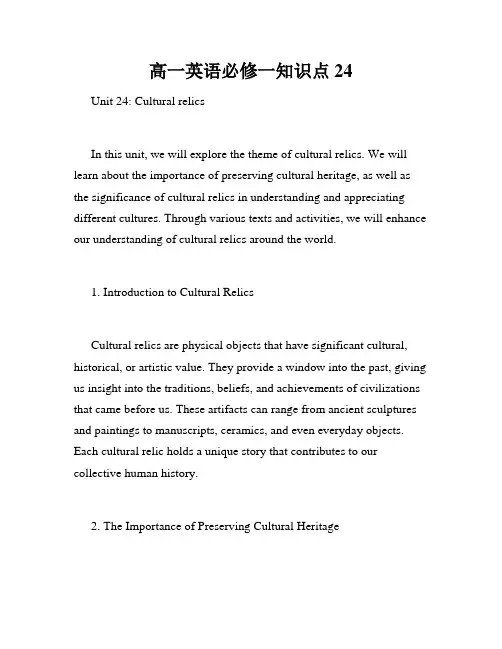
高一英语必修一知识点24Unit 24: Cultural relicsIn this unit, we will explore the theme of cultural relics. We will learn about the importance of preserving cultural heritage, as well as the significance of cultural relics in understanding and appreciating different cultures. Through various texts and activities, we will enhance our understanding of cultural relics around the world.1. Introduction to Cultural RelicsCultural relics are physical objects that have significant cultural, historical, or artistic value. They provide a window into the past, giving us insight into the traditions, beliefs, and achievements of civilizations that came before us. These artifacts can range from ancient sculptures and paintings to manuscripts, ceramics, and even everyday objects. Each cultural relic holds a unique story that contributes to our collective human history.2. The Importance of Preserving Cultural HeritagePreserving cultural heritage is crucial for several reasons. Firstly, cultural relics serve as evidence of our ancestors' existence and achievements. They give us a tangible connection to our past, helping us understand our roots and identity. Additionally, cultural relics provide valuable insights into the development of art, science, technology, and society throughout history. By preserving these artifacts, we ensure that future generations can learn from and appreciate the achievements of their predecessors.3. Cultural Relics as Educational ResourcesCultural relics are not only objects to admire, but they also serve as educational resources. Museums and cultural institutions play a vital role in sharing and interpreting these artifacts for the public. Exhibitions and guided tours provide visitors with the opportunity to learn about different cultures and historical periods. By studying cultural relics, we can gain a deeper understanding of different civilizations and their contributions to human civilization.4. Cultural Relics Around the WorldCultural relics can be found across the globe, each representing a unique cultural or historical significance. For example, the Great Wallof China, a world-renowned cultural relic, stands as a symbol of Chinese civilization and ingenuity. The Pyramids of Egypt, another iconic cultural relic, represent the achievements of the ancient Egyptian civilization. These relics attract millions of tourists every year and serve as tangible reminders of our shared human history.5. Challenges in Preserving Cultural RelicsPreserving cultural relics faces various challenges. One major issue is the threat of natural disasters such as earthquakes, floods, or fires. These disasters can damage or destroy cultural relics, wiping out valuable pieces of our history. Another challenge is the illegal trade and smuggling of cultural artifacts. This illegal activity not only robs countries of their heritage but also fuels organized crime networks. Efforts are being made to combat these challenges through international cooperation, stricter laws, and improved security measures.6. ConclusionCultural relics are not just mere objects; they are windows into our past and bridges to our future. Preserving these artifacts is essential to understand and appreciate our diverse cultural heritage. As we continue to explore the world's cultural relics, let us strive to protect, cherish,and learn from these invaluable treasures that connect us to our shared human history.In conclusion, the study of cultural relics allows us to transcend time and immerse ourselves in the richness of human civilization. By preserving, studying, and sharing these artifacts, we ensure that the stories and achievements of our ancestors are never forgotten. Let us embrace the beauty and significance of cultural relics, as they offer us a profound connection to our past and inspire us to shape a better future.。
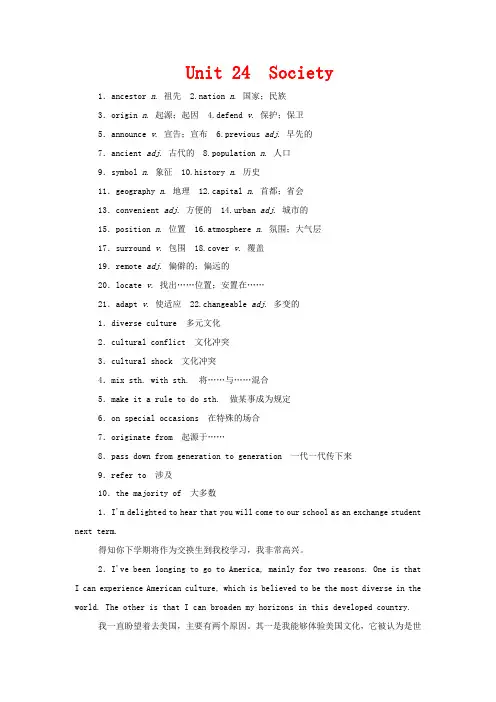
Unit 24 Society1.ancestor n. 祖先 2.nation n. 国家;民族3.origin n. 起源;起因 4.defend v. 保护;保卫5.announce v. 宣告;宣布 6.previous adj. 早先的7.ancient adj. 古代的 8.population n. 人口9.symbol n. 象征 10.history n. 历史11.geography n. 地理 12.capital n. 首都;省会13.convenient adj. 方便的 14.urban adj. 城市的15.position n. 位置 16.atmosphere n. 氛围;大气层17.surround v. 包围 18.cover v. 覆盖19.remote adj. 偏僻的;偏远的20.locate v. 找出……位置;安置在……21.adapt v. 使适应 22.changeable adj. 多变的1.diverse culture 多元文化2.cultural conflict 文化冲突3.cultural shock 文化冲突4.mix sth. with sth. 将……与……混合5.make it a rule to do sth. 做某事成为规定6.on special occasions 在特殊的场合7.originate from 起源于……8.pass down from generation to generation 一代一代传下来9.refer to 涉及10.the majority of 大多数1.I'm delighted to hear that you will come to our school as an exchange student next term.得知你下学期将作为交换生到我校学习,我非常高兴。
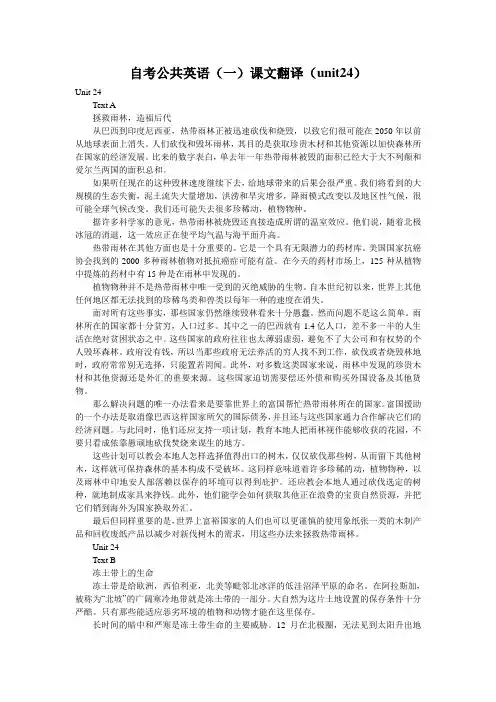
自考公共英语(一)课文翻译(unit24)Unit 24Text A拯救雨林,造福后代从巴西到印度尼西亚,热带雨林正被迅速砍伐和烧毁,以致它们很可能在2050年以前从地球表面上消失。
人们砍伐和毁坏雨林,其目的是获取珍贵木材和其他资源以加快森林所在国家的经济发展。
比来的数字表白,单去年一年热带雨林被毁的面积已经大于大不列颠和爱尔兰两国的面积总和。
如果听任现在的这种毁林速度继续下去,给地球带来的后果会很严重。
我们将看到的大规模的生态失衡,泥土流失大量增加,洪涝和旱灾增多,降雨模式改变以及地区性气候,很可能全球气候改变。
我们还可能失去很多珍稀动,植物物种。
据许多科学家的意见,热带雨林被烧毁还直接造成所谓的温室效应。
他们说,随着北极冰冠的消退,这一效应正在使平均气温与海平面升高。
热带雨林在其他方面也是十分重要的。
它是一个具有无限潜力的药材库。
美国国家抗癌协会找到的2000多种雨林植物对抵抗癌症可能有益。
在今天的药材市场上,125种从植物中提炼的药材中有15种是在雨林中发现的。
植物物种并不是热带雨林中唯一受到的灭绝威胁的生物。
自本世纪初以来,世界上其他任何地区都无法找到的珍稀鸟类和兽类以每年一种的速度在消失。
面对所有这些事实,那些国家仍然继续毁林看来十分愚蠢。
然而问题不是这么简单。
雨林所在的国家都十分贫穷,人口过多。
其中之一的巴西就有1.4亿人口,差不多一半的人生活在绝对贫困状态之中。
这些国家的政府往往也太薄弱虚弱,避免不了大公司和有权势的个人毁坏森林。
政府没有钱,所以当那些政府无法养活的穷人找不到工作,砍伐或者烧毁林地时,政府常常别无选择,只能置若罔闻。
此外,对多数这类国家来说,雨林中发现的珍贵木材和其他资源还是外汇的重要来源。
这些国家迫切需要偿还外债和购买外国设备及其他货物。
那么解决问题的唯一办法看来是要靠世界上的富国帮忙热带雨林所在的国家。
富国援助的一个办法是取消像巴西这样国家所欠的国际债务,并且还与这些国家通力合作解决它们的经济问题。
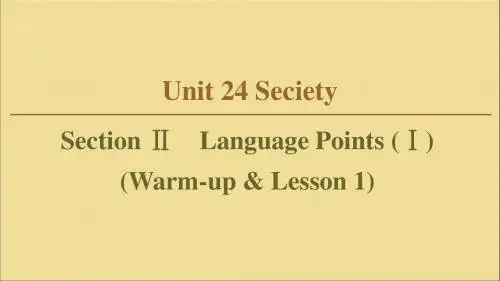
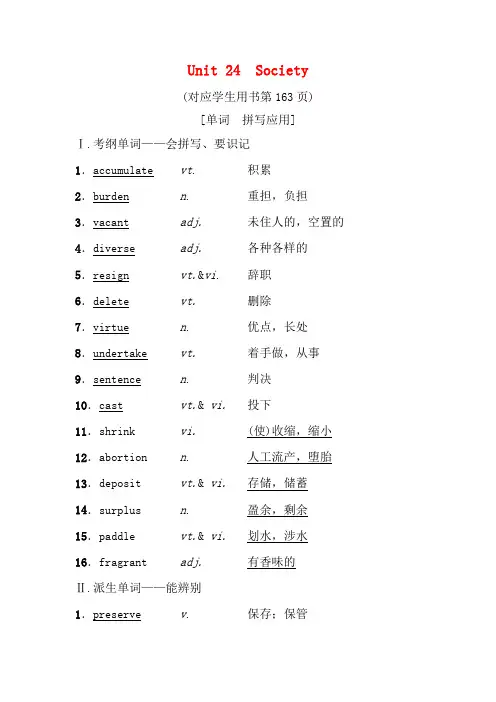
Unit 24 Society(对应学生用书第163页)[单词拼写应用]Ⅰ.考纲单词——会拼写、要识记1.accumulate vt. 积累2.burden n. 重担,负担3.vacant adj.未住人的,空置的4.diverse adj.各种各样的5.resign vt.&vi. 辞职6.delete vt.删除7.virtue n. 优点,长处8.undertake vt.着手做,从事9.sentence n. 判决10.cast vt.& vi.投下11.shrink vi.(使)收缩,缩小12.abortion n. 人工流产,堕胎13.deposit vt.& vi.存储,储蓄14.surplus n. 盈余,剩余15.paddle vt.& vi.划水,涉水16.fragrant adj.有香味的Ⅱ.派生单词——能辨别1.preserve v. 保存;保管→preservation n. 维护,保存2.edit vt.编辑→edition n. 版本→editor n. 编辑,校订者3.voluntary adj.自愿的→volunteer v. 自愿做n. 志愿者4.abundant adj.大量的→abundance n. 大量5.sign v. 签名n. 招牌;迹象→signature n. 签名6.adjust v. 调整,调节→adjustment n. 调整,调节7.elect vt.选举,推选→election n. 选举;当选;选择权8.mercy n. 仁慈,宽大的→merciful adj.仁慈的,宽大的9.rot vt.&vi. 腐烂;腐朽n. 腐败→rotten adj.腐烂的10.thirst n. 口渴→thirsty adj.口渴的11.contain v. 包装;容纳→container n. 容器12.consequence n. 结果,后果→consequently adv. 所以,因此Ⅲ.语境应用(用所给词的适当形式填空)1.Details of the election(elect) will be posted outside the town hall.2.These two signatures(sign) are very similar;can you tell them apart?3.She went through a period of emotional adjustment (adjust) after her marriage broke up.4.She was a bright and eager student and,consequently (consequent),did well in school.5.They asked her to be merciful(mercy) to the prisoners for they also have human right.6.The wood was so rotten(rot) that you could put your finger through it.7.The lake attracts an abundance(abundant) of wildlife to spend winter there.8.If you are willing to do voluntary work,you can be a volunteer.(volunteer)9.Please give me a container.I want to use it to contain some water.(contain)10.She used to edit newspapers,and now she is the editor of a dictionary which is now in its sixth edition.(edit) [拓展联想]Ⅰ.短语回顾——会默写1.come into being 形成,存在2.wind sb.up 故意惹恼某人3.show off 炫耀,夸耀4.knock into sb. 撞上某人;偶然遇到5.break into 闯入;突然开始(笑、唱等) 6.on principle 原则上7.sentence sb. to death 判某人死刑8.be well/better off 过得好/过得更好9.take...seriously 认真对待……10.above all 最重要的是;首先11.do away with 废除;摆脱,消灭12.to start with 首先13.play an important role in... 在……中起重要作用14.contribute to 促进,有助于15.take...into account 考虑;注意;体谅16.keep an eye on 注意,留意Ⅱ.语境应用(用上述短语的适当形式填空)1.Others say it's only natural that newcomers learn the language of their host nation,seeing it as a condition to ensure they can contribute to society.(2017·浙江高考)2.Do you know when the Great Wall came into being?3.He would almost knock into me before he saw me.4.The society today offers the young generation more chances to show off their talent and skills.5.We're amazed at the amazing news that he was sentenced to death.6.He thinks it's time we did away with slavery.7.We must keep an eye on the stranger who is looking back and forth all the time.8.I never smoke in public places on principle.9.As the President's car arrived,the crowd broke into loud applause.10.One must take the audience into account when making speeches.11.Children should learn above all how to observe good manners at table.12.To start with,he walked in the park for a while every morning,and then a month later he began to jog.[拓展联想]entrances of the various hutongs,whichmade it easier to keep an eye on people's movements.business.4.It's high time that sb. should do/did sth.“到某人做某事的时候了”As a society,it's high time that we took these issues more seriously. 4.到了我们采取措施保护自然资源的时候了。
2021年自考英语(二)大纲词汇表二十四life:n.生命lifeless:a.无生命的,死的;没有生气的,单调的lifetime:n.一生,终身lift:v.举起light:n.灯光;灯light up:使明亮,发亮lighting:n.照明,照明设备lightning:n.闪电lightsensitive:a.光敏的like:v.爱好;喜欢likelihood:n.可能,可能性;有希望的事likely:a.可能的,有希望的ad.很可能liking:n.喜欢,爱好limit:n.限度,限制;[pl.]范围vt.限制,限定limitation:n.限制;限度,局限limited:a.有限的limitless:a.无限制的,无限的linen:n.亚麻布,亚麻织物link:n.环节,联系vt.用环连接;联系liquid:a.液体的,液态的n.液体liquidate:vt.清偿(债务等);将(资产等)变卖list:n.目录listen:vi.听listener:n.听者,收听者literal:a.精确的,如实的;逐字的,字面的literary:a.文学(上)的literature:n.文学,文学作品;文献,图书资料litter:n.干草;杂乱无章;一窝(仔畜)vt.铺草little:a.小的Little Rock:小石城(美国阿肯色州首府)live:a.活的live on:靠…生活living:n.生活,生计load:vt.装,装载vi.装货n.负荷,负载量loan:n.暂借,贷款vt.借出,贷予local:a.地方性的,本地的;局部的localize:vt.使局部化;使地方化vi.局部化;集中location:n.定位,测位;位置,场所lock:n.&v.锁locker:n.带锁的小柜logic:n.逻辑(学);逻辑性,条理性;理由,道理logical:a.逻辑(上)的,符合逻辑的loneliness:n.孤独,寂寞lonely:a.孤独的long:a.长的longshoreman:n.码头装卸工人longterm:a.长期的look:vi.看look after:照顾;照看;照料look ahead to:向前看;展望未来look up:在字典、参考书中查找loom:vi.隐隐呈现;逼近loose:a.松的,宽的;宽松;放荡的Los Angeles:洛杉矶(美国加州西南一港市)lose:vt.遗失loss:n.遗失,丧失;损失,亏损;失败lot:n.许多loud:a.高声的Louis Pasteur:巴斯德(法国化学家及微生物学家)lovable:a.可爱的,讨人喜欢的love:vt.爱;热爱lovely:a.可爱的lover:n.情人;爱好者low:a.低lower:a.较低的loyalty:n.忠诚;忠心luck:n.运气Lucretius:卢克莱修(古罗马哲学家及诗人)lunar:a.月亮的lunch:n.午餐lung:n.肺lvy League:常春藤联合会;名牌大学的Lydia Garcia:莉迪亚·加西亚(人名)。
UNIT 24 CALL FOR ATOM PLANT PROBE GLOSSARY accident-prone a. likely to have accidents 特别易出事故的 build-up n. increase or development; forming steadily 增⼤;逐步建⽴ considerable a. fairly large or great in amount, size or degree 很⼤的,可观的 controversial a. likely to cause or causing much argument or disagreement引起争论的 crack down take disciplinary action against 对……采取严厉措施,对……进⾏制裁 defective n. a. faulty; imperfect 有缺陷的 deficiency n. state of having none or not enough缺乏,不⾜ deteriorate v. become worse in quality 变质,恶化 discharge v. send, pour or let out (gas, liquid, etc.)排出;n. the action of discharging; sth. discharged 排出;排出物 disturbing n. causing anxiety 扰乱,打扰 disused a. no longer used 不⽤的,废弃的 exclusive a. published by only one newspaper at first; not shared with others 报到的;独占的,专有的 inadequate a. not good enough in quality, ability, size, etc. 不适当的,不充⾜的 initiative n. the first movement or act which starts sth. happening ⾸创,发端 inspectorate n. a group of inspectors 视察团 inspection n. official visit to judge the quality of sth. or to see that rules are obeyed 视察 maintenance n. keeping sth. in good condition, by making repairs to it and taking care of it 保养,维修 mitigate v. make less severe 使缓和 munitions n. large arms for war, such as bombs, guns, etc. 军⽕ obsolete a. no longer used; out of date 已废弃的;过时的 probe n. careful and thorough inquiry or examination 探究radiation n. sending out light, heat, etc. 放射,辐射 renew v. give new life and freshness to; repeat 使更新;重复 restore v. give back or bring back; make well or normal again 使恢复,使回复 robust a. vigorous 强健的 scrutiny n. careful and thorough examination; close study or look. 仔细检查,详尽研究 Silo n. a tall cylindric tower or pit 筒仓 sprawl v. spread; stretch out 伸展开;蔓延 urgent a. very important, esp. which must be done or dealt with quickly or first 紧要的 ventilation n. the passing into and around a room, building, etc. of fresh air (空⽓等的)流通 caesium n. 铯 complex n. 综合企业 oxy-acetylene 氧⼄炔的 radioactive a. 放射性的 strontium n. 锶 UNIT 25 GLOSSARY absurd a. against reason or common sense, clearly false or foolish 不合理,荒谬的,可笑的,愚蠢的 abundant a. more than enough 丰富的,充裕的 ban v. forbid esp. by law 禁⽌ breeding n. the producing of young by animals, birds, etc. ⽣育,繁殖 disregard v. pay no attention to, ignore 不理,不顾,漠视,⽆视 diverse a. different, various 不⼀样的,多种多样的 drastic a. strong, sudden, and often violent or severe 激烈的,猛烈的 durable a. long-lasting 耐⽤的,持久的 encroach v. take more than what is right, usual or natural; invade 侵犯,侵占,吞⾷ enforce v. cause rules or laws to be carried out effectively; make (sth.) happen by force 实施,执⾏,强制,强迫 eradicate v. destroy complete 根除,消灭,歼灭 eradication n. extinction, putting an end to (a species)灭绝,消灭 exploitation n. the act of using fully so as to get profit 开发利⽤ floe n. large mass of ice floating on the surface of the sea ⼤块浮冰 gigantic a. usually large in amount or size 巨⼤的,庞⼤的 impose v. establish officially 正式确⽴ indiscriminately ad. unselectively; randomly; not chosen carefully ⽆选择地,不加选择地,不分青红皂⽩的 invade v. enter into and spoil; attack and spread into so as to take control of (a country, city, etc.)侵⼊,侵略 lull n. pause; a period in which activity is less 暂停,间歇,停滞期 migrate v. travel regularly from one part to another according to the season; change one‘s place of living, esp. for a limited period 定期移栖,迁移 proceed v. continue 继续 profitable a. resulting in money gain; money making 有益的,有利可图的,有钱赚的 protest n. (statement of) disapproval or objection *,反对 quota n. a limit on numbers 定额,限额 recommend v. prescribe; speak in favor of 建议,推荐 revival n. rebirth or renewal 再⽣,新⽣,恢复 revive v. come back into use or existence 两次利⽤,再⽣ roam v. walk or travel without any definite aim or destination over or through (a country )漫步,漫游 sanctuary n.( a place of) protection or safety from harm 避难所,庇护所 shift v. move from one place to another; change in position or direction 转移,移动,转变,转向 slaughter n. killing of animals 屠宰 sleek a. ( of hair or fur) smooth and shining (⽑发等)油光发亮的 suntan n. browning of the skin from exposure to sunlight 晒⿊ temporary a. lasting only for a limited time 暂时的,临时的 transform v. change completely in form, appearance or nature 彻底改变,改造,改⾰ crayon n.彩⾊蜡笔 lotion n. 护肤液 UNIT 26 ARE THESE THE BEST YEARS OF YOUR LIFE? GLOSSARY adolescence n. young teenager of about 13~16岁青春期;青春(通常指13~16岁少年) ailment n. illness 病;精神不安 apparently ad. clearly, obviously 明显地 blissful a. extremely happy ⾮常幸福;极乐的 bonus n. anything pleasant in addition to what is expected 意想不到的收获 cope v. handle; deal successfully with sth. 处理 decline v. decrease; move from a better to worse position 减少;下降 deny v. refuse to accept as true 否定;不接受 divorce v. end a marriage between husband and wife 离婚 efficient a. working well and without waste 效率⾼的 expectancy n. the state of expecting 期待,期望 foster v. help to grow and develop 培养;促进 guarantee v. give a promise of quality, payment or fulfilment 保证;担保 incidence n. the rate of happening 发⽣率 infection n. the state or result of disease being put into body 传染;感染 ingenuity n. skill and cleverness in making and arranging things 机灵;独创性 intact a. whole, uninjured; healthy 未受损的;完整的 internist n. a doctor who specializes in internal medicine 内科医⽣ maturity n. the state of being fully grown and developed 成熟 measure n. degree or amount 程度;分量;测量 neurotic a. affected with nervous disorder 神经病的;神经过敏的 outlive v. live longer than 活过…,⽐…经久 pessimism n. tendency to look at the worst aspect of things 悲观 predictable a. that can be seen or told in advance 可预⾔的 prime n. the time of greatest perfection, strength or activity 全盛时期 reassure v. comfort and make free from anxiety 使放⼼ resistance n. opposition, standing against 抵抗,反抗 share v. have in common 分享;分担 smart a. vigorous, quick in thinking, clever 精明的,灵巧的 statistical a. of collected numbers which represent facts or measurement 统计的 suicide n. an act of killing oneself ⾃杀 veteran n. a person who has had long experience ⽼⼿;有经验的⼈ anabolism n. 细胞⽣长 arthritis n. 关节炎 catabolism n. 细胞死亡 nutrient n. 营养素 psychologist n. ⼼理学家 rheumatism n. 风湿病 sonata n. (⾳乐)奏鸣曲 UNIT 27 GLOSSARY abscond v. go away suddenly and secretly because one has done sth. wrong or against the law (为躲避罪责,债务等⽽)潜逃 assault n. unlawful attack with blows against another person 攻击,袭击 bastard n. ruthless, insensitive person, illegitimate child 坏种,讨厌⿁,私⽣⼦ bumble v. speak without making much sense, or so that the words are hard to hear clearly 语⽆伦次,说话含糊 burglary n. the crime of entering a building by force with the intention of stealing ⼊室盗窃,夜盗⾏为 butchery the trade of killing, cutting and selling animals for food 屠宰业 cash n. money in coin or notes 现⾦ conviction n. finding (someone) guilty for a crime 发现有罪,证明有罪 credit n. belief of others that a person, business company can pay debt, or will keep a promise to pay 信⽤ dismember v. cut or tear (a body) apart, limb from limb 割下(动物的)肢,肢节 distressed a. suffering great pain, discomfort or sorrow 痛苦的,不舒服的,难受的,悲情的 dump v. drop carelessly 倾倒,把…砰地⼀扔 elope v. run away from home 私奔,出⾛ embark v. go on board a ship 上船 environ n. surrounding 周围,附近地区 epitaph n. words commemorating a dead person 纪念死者的诗⽂,墓志铭 indecent assault an attack with blows and some from of sexual violence 强迫猥亵,⾮礼 milk v. get money by clever of dishonest means 以巧妙或虚假⽅式取得⾦钱 monitor v. observe and watch by means of an electronic receiver (camera)监视,监控 pose v. set oneself up as; claim to be 摆出,使⾃⼰成为,⾃称 schedule n. plan for a certain future time 计划表,程序表 scrap n. a small piece; bit ⼩块,少许,⼀点 scrawl n. sth. written awkwardly or fast or carelessly 潦草模糊的字迹 semi-literate a. partly able to read and write 半⽂盲的,能读⽽不能写的 serial a. of or forming a series (set)连续的,⼀系列的 sinner n. one who has disobeyed God; wrongdoer (宗教,道德上的)罪⼈ squad n. small group of persons working or being trained together ⼩组,⼩队 traffic v. trade 交易,买卖 victim n. a person (or animal or thing) that suffers death (pain, harm, etc.) as a result of other people‘s actions 受害者,牺牲者,受骗者 vigil n. staying awake; remaining watchful for some purpose 彻底清醒,守夜,值夜 heroin n. 海洛因 quarry n. 采⽯场 UNIT 28 THE WORLD OF MICROBES GLOSSARY annoy v. cause trouble; make a little angry 打搅;使⽣⽓ arithmetic n. calculation by numbers; the science of numbers 算术,代数 bacteria n. very small living things, some of which cause diease 细菌 brook n. a small stream ⼩溪 complicated a. made up of many parts ;complex 复合的,复杂的 conquer v. defeat; be victorious over 征服 constant a. continuous; without break 持续不断的 convenient a. suited to one‘s needs ⽅便的 crumb n. small piece of bread ⾯包屑 destroy v. tear down or apart; ruin 摧毁,毁坏 disease n. (an) illness or disorder caused by infection or unnatural growth, not by an accident 疾病 favourite n. sth. or sb. loved above all others 特别喜爱的⼈或物 fertile a. (of land) which produces or can produce good crops 肥沃的 foil n. metal beaten or rolled into very thin paper like sheets ⾦属薄⽚,箔 harmful a. damaging 有害的 jelly n. a sweet soft food substance that shakes when moved, made with gelatin 果冻,⾁冻,冻 lava n. rock in a very hot liquid state flowing from an ex ploding mountain (volcano)熔岩 magnify v. make (sth.) appear larger than in reality 放⼤ microbe n. a living creature that is so small that it can not be seen without a microscope, and that may cause disease 微⽣物 moisture n. water, or other liquids, in small quantities in the form of steam or mist 潮⽓ moldy a. covered with soft woolly growth on bread or cheese, etc. 发霉的 multiply v. breed 繁殖 pickle n. vegetable in a type of liquid (esp. vinegar or salt water )泡菜 pinch n. an amount that can be picked up between the thumb and a finger (⼀)捏,微量 quantity n. a measurable property of something 量,数量 settle v. come to rest, esp. from above 着落,停留 split v. divide into separate parts 分开,劈开,切开 spoil v. (cause to)decay or lose goodness 糟塌,使变坏 stack v. make into or form a neat pile 堆起 surround v. be all around on every side 包围 volcano n. mountain with a large opening at the top through which melting rock, steam, gases etc. escape from time to time ⽕⼭ aluminum n. 铝 corkscrewshape n. 螺旋体 marble n. ⼉童游戏⽤的⼀种弹珠 mildew n. 霉 penicillin n. 青霉素 sauerkraut n. 泡菜 streptomycin n. 链霉素 vinegar 醋。
Unit 24 Society基础复习一.单词拼写1._____ (equip)so much equipment, I climbed with difficulty.2. You can’t imagine what difficulty a disabled child has __________ (govern)his behavior.3..He didn’t expect to knock________ some of his friends here.4. The __________(仁慈的) king saved the young officer from death.5.I read the whole book without ________(跳过) a page.6. He c____ a stone into the river just now..7.On entering the house, I can smell a strong (香)_______smell8. He_______________(thirst) for power.9. I’ m totally against harder sentences_____principle.10. One reason is that he has confidence, and ___________is that he is diligent.11. He _________________ (判决) to pay a fine of 1000 pounds.12. The scandal exposed, he was removed from office (consequence).13. The (商人) decided to use camels to carry his goods across the desert.14. Bicycling is a good exercise; (再者), it does not pollute the air.15. The (不平等) between the rich and poor endures..16. We shall (承担) the construction of this bridge.17 .The war made thousands of people ________(home).18. Did you see the sign(摇摆)______ in the wind?19. Think it over before you put your ________(sign) on the check./bill20.China has undoubtedly (所有权)_____ over Yuan Mingyuan’s cultural relics.21. The beggar was dressed in r___.22. Several candidates had been competing for position long before the leadership became v_________ .23. The GDP (调整)__________ of China is very remarkable.三.短语翻译e into being___________2.wind sb up_____________3.on the decrease_________4.keep an eye on________5.break into________6.on principle___________7.sentence sb to death___________ 8.contribute to______________9.hold up______________ 10.turning point________11.show off______________12.knock into______ knock down______ knock over______ know …out of ______knock about______ knock at____单词拼写1.Equipped erning 3.into 4.merciful 5.skipping 6.cast 7.fragrant 8.is thirsty 9.on 10.another 11.was sentenced 12.consequently6.merchant 14.forthermore 15.inequality 16.unertake 17.homeless 18.swinging 19.signature20.ownership 21.rags 22.vacant 23.adjustment短语:.1.形成,存在2. 故意惹恼(某人)3.在减少4.照看,注意 5.闯入6.原则上7.判某人死刑8.促成,对……有贡献9.使耽搁,推迟10转折点11.炫耀12. 将…钉到…里,灌输… ;.撞到,拆除;把…撞到; 把…敲出来; 漫游,流浪;敲。
Unit 24 单元尾核心要点回扣单元尾核心要点回扣Ⅰ.重点单词1.________adj.自愿的________ad v.自愿地,主动地2.________v t.统治,管理________n.政府,统治______n.统治者,管理者3.________v t.&adj.拥有;属于自己的→________n.物主,所有人→________n.所有权4.________v.编辑→________n.版本→________n.编辑,编辑人5.________adj. 作为结果的→_____n.结果,后果→______ad v.所以,因此6.________adj.大量的,充裕的,丰富的→________ n.充裕,丰富7.________v t.选举,推选→________n.选举,推选8.________n.宽大,仁慈→________adj.宽大的,仁慈的9.________ n.口渴→________ adj.口渴的10.________ v t.调整,调节→________ n.调整,调节【答案】 1.voluntary;voluntarily ern;government;governor 3.own;owner;ownership 4.edit;edition;editor 5.consequent;consequently 6.abundant;abundance7.elect;election 8.mercy;merciful9.thirst;thirsty 10.adjust;adjustmentⅡ.重点短语1.knock ________撞上某人;偶然遇上knock down 撞倒;击倒;推倒;拆除knock ________ 把……打翻;把……撞倒knock off 停止;中断knock about /around 漫游;闲逛knock ________ 敲(门、窗等)2.set ________ 建立;创立set off 出发;动身(去某地);引爆set ________ 出发;动身;开始hutongs,which ________ to keep an eye on people's movements.他们派卫兵把守着胡同的入口,这样做使他们容易监视人们的举动。
2021年高中英语暑期备考Unit24考点讲与练北师大版单元知识点复习(Unit 24, Module 8)ExercisesⅠ.依照句意,用方框内所给单词的适当形式填空,每个单词限用一次。
1. Mo hammed.2. As people more wealth, they tend to spend a greater proportion (部分) of their incomes.3. She does a lot of work for the Red Cross.4. If you are self-employed, you should think about taking out a pr ivate .5. I’m worried about washing that shirt in case it .6. He from the company in order to take a more challen ging job.7. They go to thepolls (投票处) on Friday to choose the people they want to their country.8. The resources and stable policy provide foreigners with the advantages of investing here.9. Buying a house in a big city often places a largeon young people.10. The company has announced that it will a full inves tigation into the accident.Ⅱ. 依照句意,用括号内所给动词的适当形式填空。
1. —Jack, you look so tired!—Well, I (paint) the house and I have to finish the w ork today.2. I (work) at the same job since 2001.3. The book (translate) into thirty languages since it(publish) in 1973.4. —We (expect) that you would paint the walls last week.—I’m sorry! I (intend) to paint them last week, but I’d been too busy.5. —Did you watch the basketball match yesterday?—Yes, I did. My brother, you know, (play) in the mat ch.Ⅲ. 高考真题链接。
自学考试英语考前重点复习(unit24)自学考试英语考前重点复习(unit24)Text A Saving the Rainforests for Future GenerationsⅠ.New words:带有前缀的单词:deforestation: v.& n. 开伐森林ecosystem: n. 生态系统ecospecies:生态种overpopulate: v. 使人口过密population: n. 人口international:国际的nation: n. 国家,民族inter- 表示“在一起,交互”之义export: n. & vt. 输出,出口port:港口import:进口recycle: vt. 使再循环,使再生;n.再循环,再生economy n. 经济economic a. 经济(上)的economics n. 经济学economical a. 节约的consequence: n. 结果,后果consequent: a. 作为结果的massive: a. 大量的;大而重的,魁伟的mass: n. 群众,大量regional: a. 地区的region: n. 地区globe: n. 地球global: a. 全球的contribute: v. 贡献,捐献contribution: n. 贡献,捐献,投稿contributor: n. 捐助者,贡献者senseless: a. 无知觉的;无意义的,愚蠢的living: n. 生活,生计make one's living 谋生newly: ad. 新近,最近;重新,以新的方法合成词:rainforest: n. 热带雨林rainfall: n. (降)雨量;一场雨greenhouse: n. 温室forestland: n. 林地make-up: n. 组成,化妆课文中出现的重点单词:1.upset v. 弄翻,打翻;使苦恼过去式、过去分词:(upset-upset-upset )a. 不安的;不适的;不舒服的E.g.: The large wave upset the boat.He is upset because of the generation gap.2.contribute (vi./vt)E.g.: The Nobel Prize winner contrib uted much to the research in this field.contribute to:有助于;捐献;起作用His carelessness contributed to the a ccident.3.derive v. 由…。
得到(from);起源,由……派生(from)E.g.: He derived his love for table tennis from his father.Many English words derived from Frenc h.4.cancel v. 取消;删除E.g.: The decision of the court canc elled the contract.5.owe : vt. 欠(债等),应该向(某人)付出;应该把…归功于(to)E.g.: I owe a great deal to my famil y and my friends for their support.His success does not owe to luck but hard work.Phrases:1.speed up (使)加速E.g.: The heart speeds up.We should make double efforts to spee d up socialist construction.2.threaten with 用…威胁,恐吓E.g.: The boss threatens the employees w ith dismissal.老板以开除来威胁员工。
3.at the rate of 以…速度或比率He drives at the rate of 40 kilometer s per hour.The population in this country is inc reasing at the rate of 1%.4.in the face of 在…面前,当着…的面;不顾face: n. 脸;正面 v. 面对E.g.: He was brave in the face of da nger.5.stop…。
from…阻止…做…I can hardly stop myself from shoutin g at him.Having no money cannot stop them from falling in love.6.pay off 偿还;没有白费He plans to pay off the loan (贷款) i n five years.7.solution to 解决…的方法st but not least 最后的但并非最不重要的Last but not least, we must find a p eaceful solution to the problem.Ⅱ.Text ASaving the Rainforests for Future Gen erations:拯救热带雨林,造福子孙万代Para1:Rainforests are being cut and burned from Brazil to Indonesia at such a rate t hat they could well disappear from the ea rth's surface before the year 2050.译:从巴西到印尼,热带雨林正在被砍伐,被烧毁,其速度非常之快,以致于到不了2050年,热带雨林就会被砍光烧光而从地球表面上彻底消失。
They are being cleared for valuable tim ber and other resources to speed up the e conomic growth of the nations in which th ey are located.are being cleared:现在进行时的被动语态译:为了获取贵重木材和其它资源,加速热带雨林地区的国家的经济发展,热带雨林正在逐渐被砍伐得干干净净。
The most recent figures show that the area of rainforest destroyed last year a lone was bigger than the size of Great Br itain and Ireland.译:最近的统计数字表明,仅去年一年被毁掉的热带雨林的面积就比英国和爱尔兰两国的面积加起来还大。
be+ being +V(p.p)clear v. 清除,扫除speed:加快locate: v. (使)坐落于,位于Para.2If the present rate of deforestation is allowed to continue, the consequences for the earth will be great.译:如果听任目前采伐森林的速度继续发展下去,那么给整个地球所带来的后果将是十分严重的。
We shall see a massive upsetting of e cosystems, very large increases in soil erosion, increases in flooding and in dr ought, changes in rainfall patterns and regional, quite possibly global, change s in climate. We shall also probably lose many rare plant and animal species.译:我们将会看到:生态系统失衡;土壤侵蚀现象大规模增加;水灾、旱灾大规模出现;降雨方式改变;地区气候改变,甚至可能导致全球气候的改变。
我们也许会永远失去很多种珍稀的植物和动物。
in:在……方面contribute to :促成,导致Para.3According to many scientists, the bu rning of rainforests is also directly con tributing to the so-called greenhouse eff ect. This effect, they say, is raising average temperatures and sea levels as th e polar ice caps recede.译:根据许多科学家报告,烧毁热带雨林也直接导致了所谓的温室效应。
科学家们都说,这种温室效应正在使全球平均气温升高,正在使南极和北极地区的冰冠融化,随之而来的也正在使全球海洋的水平面上升。
contribute to(to 介词):有助于raise vt.rise vi.Para.4The rainforest is essential in other areas also. It is a medicine chest of unl imited potential. The US National Cancer Institute has identified 2,000 rainfores t plants which could be beneficial in fig hting cancer. In today's pharmaceutical m arket, 15 of the 125 drugs derived from plants were discovered in the rainforest.chest:胸膛;箱。
译:从其它方面来看,热带雨林对人类也是必不可缺的。
热带雨林是一个有着无限潜力的医药资源宝库。
美国国家癌症研究院已经证实了有2000种热带雨林中的植物对预防和治疗癌症有奇效。
在今天的药品市场上,125种单味药中,就有15种是从热带雨林发现的植物中提取出来的。
Plant species are not the only forms of life threatened with extinction in therainforest. Rare birds and animals that cannot be found anywhere else in the worl d have been disappearing at the rate of o ne a year since the turn of the century.译:各种植物在热带雨林中并不是受到灭种威胁的唯一生物。